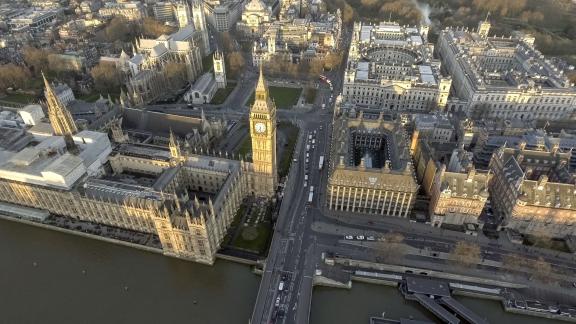Queen’s Speech 2022: what you need to know
Key points
- The Queen's Speech focused on measures to grow and strengthen the economy. It proposed a levelling up and regeneration bill to enshrine the government’s flagship policy and to hold the government itself accountable for reporting on progress against the levelling up white paper’s missions.
- Health-specific announcements included the draft Mental Health Act reform bill and the conversion therapy bill, both of which are welcome. Although the different treatment of trans people in the bill is disappointing, we look forward to working with the government in its further consideration of the issue.
- Overall, the speech's proposals are a step in the right direction for levelling up, with announcements surrounding County Deals providing a new route for joining up public services, helping to bolster integration efforts. However, the lack of new measures to support clearing the NHS backlogs and the risks inherent in a legislative approach to data reform present risks to the NHS.

The Queen’s Speech signals the state opening of parliament and sets out the government’s legislative plans for the session ahead.
What was announced?
With the Queen noticeably absent, HRH Prince Charles, the Prince of Wales, delivered the stated aims of the government:
- grow and strengthen the economy
- ease the cost of living
- level up opportunities across the country and support people into work
- ensure ministers can support the police to make the streets safer
- fund the NHS to clear the backlogs.
Full details of the announcements can be found on the Gov.UK website. New proposals most relevant to the health service are listed below.
Levelling up and regeneration bill
- A duty on government to set levelling-up missions and to produce an annual report, updating on their delivery.
- The creation of the County Deal: a new model of combined authority, giving local leaders powers to enhance local accountability, join up services and provide transparent decision-making to rejuvenate their communities, increase their ability to reflect local preferences in arrangements, including directly elected leaders’ titles.
- New powers for local councils to instigate rental auctions of vacant commercial properties in town centres and high streets.
Draft Mental Health Act reform bill
- Amending the definition of mental disorder, ensuring nobody can be detained solely for having a learning disability or being autistic.
- Changing the criteria for detaining people, so that the Act is used only where it is necessary: where the person is a genuine risk to their own safety or others, and there is therapeutic benefit.
- Better support for patients, including the offer of an independent mental health advocate, and allowing patients to choose their ‘nominated person’.
- Introducing a 28-day time limit for transfers from prison to hospital for acutely ill prisoners and ending the temporary use of prison for those awaiting assessment or treatment.
- Introducing a new form of supervised community discharge, allowing the discharge of restricted patients into the community, with the necessary care and supervision to adequately and appropriately manage their risk.
- Increasing the frequency with which patients can make appeals to tribunals on their detention and provide tribunals with a power to recommend that aftercare services are put in place.
- Introducing a statutory care and treatment plan for all patients in detention. This will be written with the patient and set out a clear pathway to discharge.
Conversion therapy bill
- Banning conversion therapy practices intended to change sexual orientation, though notably not gender identity.
- Introducing a criminal offence banning non-physical conversion therapies to complement existing legislation which protects people from acts which inflict physical harm. The offence will protect under-18s, regardless of circumstance, and over-18s who do not consent and who are coerced or forced to undergo conversion therapy practices.
- Introducing Conversion Therapy Protection Orders, which would set out certain conditions to protect a person from undergoing conversion practices, including removing a passport for those at risk of being taken abroad, or any requirement the court considers necessary to protect that person
- Protecting clinicians’ independence and ability to support people. Robust, exploratory and challenging conversations which are part of regulated care do not fall within the scope of the ban.
Data reform bill
- Enabling public bodies to share UK citizens’ personal data to improve services while protecting it to a gold standard.
- Using data and reforming regulations to enable more efficient data-sharing between public bodies, to improve the delivery of services.
- Designing a more flexible, outcomes-focused approach to data protection that helps create a culture of data protection, rather than ‘tick-box’ exercises.
The speech also included a section on funding the NHS to clear the COVID-19 backlogs. It contained previously announced measures, as well as a review of previous announcements on future COVID-19 vaccinations, and a women’s health strategy. In addition, following Brexit, a procurement bill is being brought forward, which will enshrine the objectives of public procurement and include clearer arrangements for contracting authorities to buy at pace.
The speech stated that other measures will be laid before parliament, allowing for further legislation during the session.
Analysis
Given the current economic climate, the focus on growing the economy and the cost of living was expected. Measures included in the levelling up and regeneration bill, which will bring empty properties on the high street into use, are welcome and could provide opportunities to address estates issues for the NHS in line with the ambitions set out in our Health on the High Street report.
The levelling-up missions and annual progress report will be a key tool in charting progress against the ambition to level up disparities in health outcomes
Building on the government’s recent levelling up white paper, the speech committed to setting levelling-up missions and providing an annual progress report. This will be a key tool in charting progress against the ambition to level up disparities in health outcomes – including narrowing the gap between areas with the highest and lowest healthy life expectancy (HLE) by 2030 and to have increased HLE by five years by 2035.
Disappointingly, the speech contained little to address the immediate cost-of-living crisis
The bill will create a new model of combined authority, the County Deal, which will provide local leaders with powers to enhance local accountability and join up services. We expect these to prove a useful tool for integrated care systems (ICSs) as they establish integrated care partnerships (ICPs) and place-level arrangements. Ultimately, the success of ICSs and levelling up relies on local leaders and institutions working together, and as anchors, to benefit their areas economically and to improve population health.
Disappointingly, the speech contained little to address the immediate cost-of-living crisis. Poverty is a key driver of poor mental and physical health, and can in turn lead to increased demand for the NHS. Our members from across the system, particularly in urgent and emergency and primary care, are seeing increased presentations related to the wider determinants of health.
No material policy change nor new funding was announced to tackle the increasing elective care backlog. The recent Elective Recovery Care Plan set targets for the coming months and years to actively reduce the number of people waiting. The service has made considerable progress against its first target to eliminate all waits over 104 weeks by July this year. Nationally, the number was reduced by 33 per cent over the two months to April.
However, there are further challenging deadlines set against record demands. GP appointments are now exceeding pre-pandemic levels, including supporting people on waiting lists to ‘wait well’. There are continued staff shortages as well as medically optimised patients unable to be discharged due to lack of capacity in the system.
The Mental Health Act reform bill will have positive and far-reaching impacts for patients
We welcome the commitment to bring forward new mental health legislation. With more people being detained every year, accompanied by unacceptable disparities in rates of detention for some ethnic minorities, it is important that throughout the bill’s passage and its later implementation, we do not forget that reducing this disparity was one of the key drivers behind the reform.
The bill will have positive and far-reaching impacts for patients, creating opportunities for them to challenge decisions made about their care, changing the criteria for detention, and removing having a learning disability or autism as grounds for detention.
We are glad the government has listened to the sector and will now be completing pre-legislative scrutiny. The bill is complex and wide reaching and it is important we get this right. Implementation is key and our Mental Health Network and ICS Network members will need the resources and time to implement the legislation. The new duty on commissioners to ensure an adequate supply of community services for people with a learning disability and/or autism will be particularly challenging and will need targeted resourcing. There are also long-term capital funding implications for the NHS, and workforce needs for the NHS, local authorities and the criminal justice system that need to be addressed.
The Mental Health Network published a useful summary of the key aspects of the reform last year.
We are disappointed that the government has not closed the loophole on consent for over 18s
We are pleased to see a commitment to banning so-called conversion therapy in the Queen’s Speech – but any ban must include all members of the LGBTQIA+ community, and we expect that to include protections for trans people. Conversion therapy is considered by all psychological therapy and psychiatric professional bodies to be unethical, harmful and unsupported by evidence. It represents an unacceptable risk of serious harm to anyone who is struggling with their sexuality or gender and who may be particularly vulnerable at the point of seeking help. We support the government’s further work to also protect trans people from these harmful practices.
We are disappointed that the government has not closed the loophole on consent for over 18s. In a survey of NHS leaders, it was agreed that consent is invalid for conversion practices and would create wriggle room that would leave vulnerable people subject to coercion and abuse.
If the data reform bill diverges too far from the EU GDPR it could risk jeopardising the UK-EU data adequacy decision
The data reform bill will propose changes to the UK’s obligations under GDPR and will affect all sectors, including the NHS and the wider healthcare sector. Although the full contents of the bill are not known, they will be based on the government’s response to the data protection consultation, the publication of which is imminent. However, based on the proposals set out in the consultation and the commitment in the speech to ‘reform regulations’, we remain concerned about the legislative route, with NHS members preferring a guidance-based approach. This is due to the proposals outlined in the consultation being disproportionate, creating confusion rather than clarity, and demanding significant changes to research practices and resources to understand and implement the new legislation.
Furthermore, if the bill diverges too far from the EU GDPR it could risk jeopardising the UK-EU data adequacy decision. The decision determines how aspects of cross-border health and social care are delivered, how patients access care, and governs how health data is shared for medical care and research purposes. Without a data adequacy agreement at the end of the transition period, there could be changes to many aspects of our cooperation with the EU on health including for access to reciprocal healthcare arrangements; protecting public health security; and providing continuity for medical research and innovation. Further information on data adequacy can be found in our briefing.
How we will be supporting members

Levelling up: Through our Health Economic Partnerships work we will continue to support members’ understanding of the role of the NHS and other institutions as anchors in their communities. We are working with the IPPR to engage the NHS in a Commission into Health and Prosperity and with the Civic Universities Network to develop relations between the NHS and universities as anchor institutions.

Conversion therapy: We will continue to support the need for an inclusive ban of so-called conversion therapy through our Health and Care LGBTQ+ Leaders Network, and as signatory to the Memorandum of Understanding on Conversion Therapy in the UK Version 2. We look forward to working with the government to ensure trans people are also protected against harmful conversion practices.

Mental Health Act reform bill: Our Mental Health Network has been engaging with the government throughout the long process to this point, and we will continue to work with them and the wider sector to make sure our members’ views are considered, ensure the legislation works for patients and services, and that plans for implementation strike the right balance of being ambitious and realistic.

Data reform bill: We will analyse the government’s response to the upcoming data reform consultation, which is the legal vehicle for implementing the reform proposals set out. We will also continue to convene the health sector, consolidate views on the proposals and ensure they are heard by the government drafting team.

COVID-19 backlogs: We will continue to work with members to raise the real challenges and barriers members face in bringing down the elective backlog - including work to influence national policy, convening expert advisory groups to ensure NHS leaders’ voices are heard, and actively communicating the challenges and solutions needed to wider public audiences.



